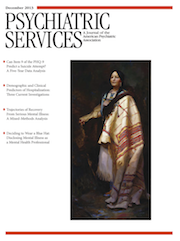Use of Administrative Data to Identify Off-Label Use of Second-Generation Antipsychotics in a Medicaid Population
Abstract
Objective
The use of second-generation antipsychotics for conditions not approved by the U.S. Food and Drug Administration (FDA) is a prevalent phenomenon with important implications. The objective of this study was to determine the accuracy of administrative claims for identifying off-label use of second-generation antipsychotics in a Medicaid population in 2009.
Methods
The authors estimated the sensitivity, specificity, positive predictive values (PPV), and negative predictive values of Medicaid claims data for detecting off-label use of second-generation antipsychotics in the electronic health records of 788 patients. Separate estimates were calculated for patients without schizophrenia and bipolar disorder, the two most long-standing FDA indications for use of second-generation antipsychotics, and for a subset of patients using a second-generation antipsychotic with indications for treatment-resistant depression.
Results
Medicaid claims determined a lack of schizophrenia and bipolar disorder in the medical record with a sensitivity of 72% and a specificity of 85%. The prevalence of identifying neither diagnosis was 83%, which was associated with a predictive ability (PPV) of 96%. Among those using a second-generation antipsychotic with an indication for treatment-resistant depression, the sensitivity, specificity, and PPV of Medicaid claims for identifying off-label use were 41%, 86%, and 87%, respectively.
Conclusions
Medicaid claims data had high predictive ability for identifying users of second-generation antipsychotics who did not have documentation of schizophrenia or bipolar disorder in the medical record. The predictive utility of the claims was diminished when the analyses were limited to patients using a second-generation antipsychotic with an indication for treatment-resistant depression.



